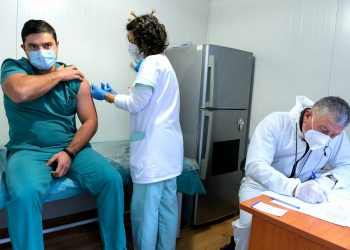Many people struggle to recover from ‘long COVID’, the acute infection, suffering often disabling symptoms and long-term effects that last weeks or months. In some cases long COVID comes with disabilities that are likely to be very long lasting.
Our understanding of this new condition, now termed Long COVID, is growing rapidly. For this, we owe a great deal to many people, but especially to those affected who have come together to document, analyse and report on the complex nature of this condition and its impact on their lives, as well as the health professionals, in some cases themselves suffering from Long COVID, who have initiated important research projects.
What is long Covid?
Often referred to as “Long COVID”, these symptoms, which can include fatigue, shortness of breath, “brain fog”, sleep disorders, fevers, gastrointestinal symptoms, anxiety, and depression, can persist for months and can range from mild to incapacitating. With one in 10 people still feeling ill 12 weeks after having COVID-19, authorities must do more to support them, a UN-backed policy brief issued on Thursday argues.
Long COVID has a serious impact on people’s ability to go back to work or have a social life. It affects their mental health and may have significant economic consequences for them, their families and for society. Implementing well-functioning patient registers and other surveillance systems; creating cohorts of patients; and following up those affected. Also WHO support the research which is so critical to understanding and healthcare treating.
In the wake of the pandemic – Preparing for Long COVID
WHO document summarizes what is known so far about “long COVID” and how countries are addressing the condition, whose troubling symptoms include severe fatigue and increased damage to the heart, lungs and brain. The policy brief was published by the World Health Organization’s (WHO) Regional Office for Europe and the European Observatory on Health Systems and Policies.
Struggling to be taken seriously
Dr. Hans Kluge, WHO’s Regional Director, said long COVID is an extra cause for concern amid the pandemic, which has already caused immense suffering. “It’s important that patients reporting with symptoms of long COVID are included as part of the COVID-19 response to mitigate some of the longer-term health impacts of the pandemic”, he said.
Long COVID is not fully understood, but available data indicate that roughly a quarter of people suffer from symptoms four to five weeks after testing positive for the coronavirus, and about one in 10 still experiences symptoms after 12 weeks. Patients, who include medical professionals, struggle to be taken seriously. They report feeling stigmatized and unable to get a diagnosis, receiving “disjointed” care, while also facing problems in accessing health and disability benefits.
Involve patients in research and response
The policy brief highlights areas for action, including through developing “new care pathways”, creating appropriate services, and tackling wider consequences such as employment rights, sick pay policies and access to disability benefits. Patient registers and other surveillance measures should be implemented, and research into post-COVID conditions must be conducted in collaboration with patients and care providers.
“Long COVID has demonstrated the importance of involving patients in research”, said Dr. Selina Rajan, lead author of the policy brief.
“However, much remains to be understood about the long-term, multisystem consequences of COVID-19 infections in children and adults, and the interventions required to treat them.”















